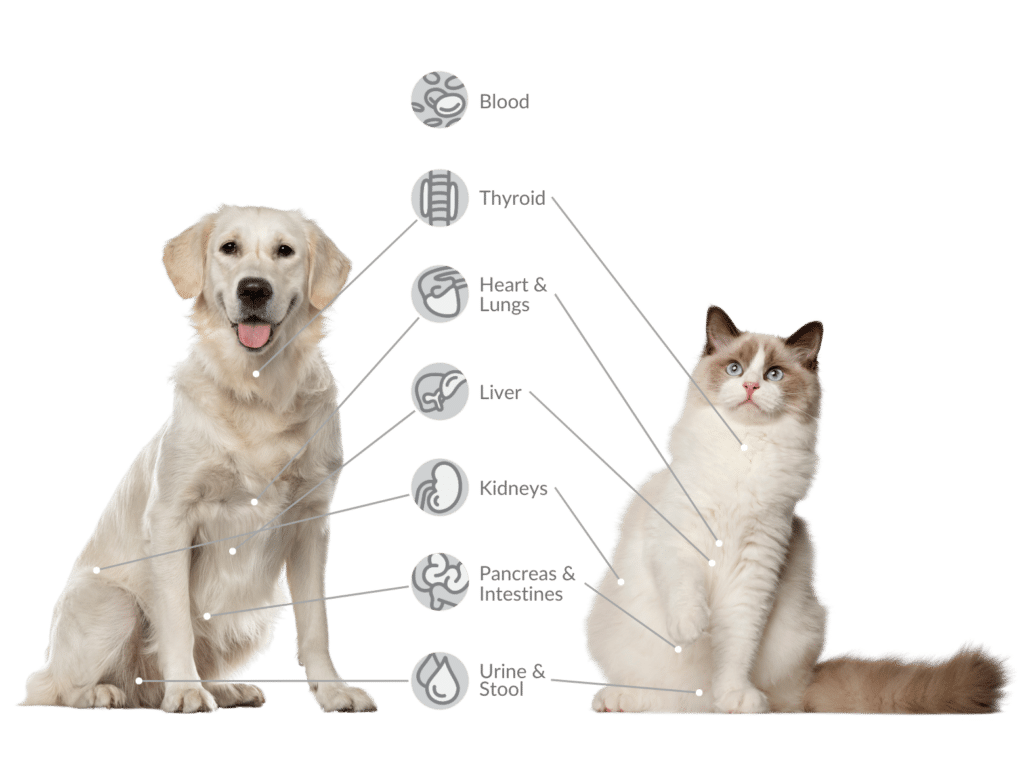Loving them is easy. Now protecting them is too.
Put your pet first and be rewarded—with our Pawtection Package!


Your Pawtection Package Includes:
- Nose to tail exam
- Vaccines*
- Early detection bloodwork*
You make a lot of decisions about your pet’s wellness care. Choosing between services shouldn’t be one of them. With the Pawtection Package, you can save 30% OFF your pet’s recommended vaccines, simply by scheduling a wellness exam + blood work!
*Offer valid for new and existing clients. Not valid with any other offer. Discount applies to vaccines only and must include the purchase of a wellness exam and bloodwork.
*Your veterinarian will tailor vaccine and bloodwork recommendations based on your pet’s age, lifestyle and risk factors.
Early detection bloodwork for pets help support their health and well-being.
Here’s what we check when your pet visits:

Pawtection Package - Book now
Arrowhead Animal Hospital offers comprehensive pet wellness exams and customized wellness plans for dogs and cats in the Westminster, CO area. Our team recommends bringing healthy, adult pets to our veterinary clinic at least once every year for their regular pet wellness exam. Animals age around 5-6 years for every human year, so routine visits become increasingly important to helping them stay healthy and comfortable well into their senior years.
Or call us at (303) 469-1616.
“An ounce of prevention is worth a pound of cure.” – Benjamin Franklin
Annual pet wellness exams for both dogs and cats allow the veterinarian to detect any significant changes in health, as well as diagnose and treat any diseases as early as possible. For dogs, we will also suggest annual heartworm and fecal parasite testing, and year-round parasite prevention.
Age-Specific Wellness Programs
At Arrowhead Animal Hospital, we have developed age-related wellness programs that can be tailored to your pet’s health, needs, and lifestyle.
For puppies and kittens we recommend a series of exams to screen for parasites, ensure their wellness, and begin their immunizations. These exams will also include parasite prevention screening and deworming, and testing for feline leukemia in cats and kittens. Your veterinarian will recommend spaying or neutering your pet around the age of six months.
Aging pets also need special care. We offer a senior pet wellness program that includes regular physical exams, bloodwork analysis, teeth cleaning, and weight and nutritional counseling. Dogs and cats age about seven to nine times quicker than humans, therefore their medical issues may advance more rapidly. Consistent and frequent veterinary visits help us detect and treat medical problems as early as possible.
Wellness Services
Arrowhead Animal Hospital is dedicated to keeping your pets happy and healthy by providing the following:
COMPREHENSIVE PET EXAM
The physical exam is very important to your pet’s wellness as on average, the veterinarian will discover three additional health concerns not previously mentioned by the pet owner. A typical physical exam includes:
- An eye exam using an ophthalmoscope
- An ear exam using an otoscope
- A heart and lung auscultation using a stethoscope
- Abdominal palpation
- Evaluation of the rest of the body including teeth, skin, coat, vital signs, body condition, and joints
INTERNAL MEDICINE
Internal Medicine is the diagnosis and treatment of diseases inside the body, such as:
- Pancreatitis
- Kidney/Urinary disease
- Internal infections
- Cancer
- Diseases of the Liver
- Diseases of the Gallbladder
- Diseases of the Endocrine system (Diabetes, Adrenal, Thyroid, etc.)
- Heart disease
Our facility is equipped with an in-house laboratory, diagnostic equipment, and a state-of-the-art ICU. Our team is trained to provide the highest level of care for pets experiencing illness.
DIAGNOSTICS
Breed Specific Certifications
Penn-hip Certifications
PennHIP stands for the University of Pennsylvania Hip Improvement Program.
PennHIP is a multifaceted radiographic technology (x-ray) for hip evaluation. The technique assesses the quality of the canine hip and quantitatively measures canine hip joint laxity. The PennHIP method of evaluation is more accurate than the current standard in its ability to predict the onset of osteoarthritis. Osteoarthritis, also known as degenerative joint disease (DJD), is the hallmark of canine hip dysplasia (CHD). More information can be found on the PennHIP website located at www.pennhip.org. Only specially trained radiologists can perform this evaluation and one of the radiologists we use is trained in this procedure.
OFA Certification
The Mission of the OFA
To promote the health and welfare of companion animals through a reduction in the incidence of genetic disease.
The OFA is guided by the following four specific objectives:
- To collate and disseminate information concerning orthopedic and genetic diseases of animals.
- To advise, encourage and establish control programs to lower the incidence of orthopedic and genetic diseases.
- To encourage and finance research in orthopedic and genetic disease in animals.
- To receive funds and make grants to carry out these objectives.
The OFA Databases
The OFA databases are core to the organization’s objective of establishing control programs to lower the incidence of inherited disease. Responsible breeders have an inherent responsibility to breed healthy dogs. The OFA databases serve all breeds of dogs and cats, and provide breeders a means to respond to the challenge of improving the genetic health of their breed through better breeding practices. The testing methodology and the criteria for evaluating the test results for each database were independently established by veterinary scientists from their respective specialty areas, and the standards used are generally accepted throughout the world.
CLIENT EDUCATION & CONSULTATION
In addition to providing comprehensive patient care in-clinic, our veterinary team is committed to extensive client education and consultation. We understand that at-home care for your pet can be overwhelming. The veterinarian will take time during the examination process to discuss their findings and recommendations and answer any questions. At Arrowhead Animal Hospital, we partner with pet owners to ensure that pets live a long and happy life.
SCREENINGS
Laboratory testing is one of the most important diagnostic tools for both detecting and diagnosing illness in pets. Our facility has extensive laboratory equipment on-site, in addition to a large array of in-house tests, and a trained team available to provide results and develop a treatment plan as quickly as possible.
Our in-house tests include:
- Blood Tests
- Pre-anesthetic Panel
- General Health Profile*
- Electrolytes Thyroid Panel
- Complete Blood Count**
- NSAID Panel***
- Kidney Panel***
- Pancreatic Testing
- Heartworm
- FeLV/FIV
For patients undergoing anesthesia for a routine surgical procedure, a Pre-anesthetic Panel, Electrolytes Panel, and Complete Blood Count are recommended to identify and prevent any potential risk.
*The General Health Profile is the most comprehensive panel for use in establishing baselines, screening senior pets for abnormalities and evaluating sick pets. We recommend running this panel on clinically ill patients to help target the cause of presenting signs and symptoms.
**The Complete Blood Count screens for anemia, infection, dehydration, blood cell abnormalities, and blood parasites through a microscopic exam of the blood cells.
**NSAID Panels (Non-steroidal anti-inflammatory drugs) and Kidney Panels are both used for therapeutic drug and treatment monitoring.
Fecal Analysis and Tests:
- Fecal Parasite Exam
- Parvovirus Test
- Giardia Test
Routine fecal parasite testing is highly recommended as many signs of internal parasites are not very obvious and these parasites can also affect humans.
Other Tests:
- Urinalysis
- Skin Scraping
- Lump Aspirates
- Ear Swabs
- Vaginal Smears
- Semen Analysis
These other tests require microscopic exams of the cells that the veterinarian will sample. Arrowhead Animal Hospital also has a partnership with IDEXX, an outside reference laboratory, for expanded testing with quick results.
PAIN MANAGEMENT
The field of veterinary pain management has been an area of intense interest and progress over the last decade. There are two basic types of pain: acute pain & chronic pain. Acute pain is the type that abruptly begins to hurt. It may be due to trauma, surgery, etc. Chronic pain is pain that has been present over a longer period of time (i.e. – arthritis, back pain, etc.). We believe that a multimodal approach to pain management is the most effective, and can tailor a protocol to your individual pet to manage its pain. See the tabs to the left for further information on each type of pain.
Acute Pain Management
Acute pain by definition is pain that is sharp; poignant and has a short and fairly severe course. When this type of pain occurs, contact our office and schedule an appointment to have your pet examined to determine what is causing the pain and the best plan to relieve it.
Chronic Pain Management
Chronic pain by definition is pain that continues over a long period of time. There are many ways to manage this type of pain depending on the actual cause of the pain. Surgery, medications, or Laser therapy are just a few of the types that may be able to ease the chronic pain your loved one is experiencing.
Laser Therapy for Pets
What will the application of laser therapy do for my pet?
Laser therapy applied with the Companion therapy laser system provides a sterile, pain-free, surgery- free, drug- free treatment which is used to treat a variety of injuries, wounds, fractures, neurological conditions, numerous dermatological problems, and pain. Whether your pet is rehabilitating from trauma or injury, healing from wounds, or simply aging, your companion will benefit from this revolutionary new approach to Veterinary medicine.
Laser therapy is the only course of treatment that actually stimulates the body to heal from within. Non-thermal photons of light are administered to the body and absorbed by the injured cells. The cells are then stimulated and respond with a higher rate of metabolism. This results in increased circulation from the body, an anti-inflammatory reaction, relief from pain and an acceleration of the healing process.
What to expect during a Companion Laser Therapy treatment session for your companion?
Simply put, it provides relief.
As the laser is administered, your pet will relax and enjoy, much like you, experiencing a good massage. The almost immediate relief of pain will allow your pet to be comfortable and any anxiety that your pet initially experienced will dissipate. Angry feline companions will start to purr and most of our canine companions will actually fall asleep during their therapy session.
Frequently, after therapy, the quote is heard: “Our young animal is back” or “she acts like a puppy again.” – Pain relief is provided in just a few minutes of therapy and that alone improves the quality of life for your best friend.
For more information go to the Companion Therapy Laser Website: http://www.companiontherapylaser.com/Pages/pet-owners
Acupunture
What is Acupuncture? It is an ancient practice developed in China of inserting very small needles through the skin to promote health and normalize bodily functions. It is especially useful in veterinary medicine to decrease pain from injury or arthritis and to improve neurologic function.
What is Medical Based Acupuncture? This practice uses an integration of eastern and western perspectives to provide a comprehensive treatment regimen. A combination of traditional Chinese meridians and western trigger point therapy, are used to direct needle placement.
Does Acupuncture hurt? The sensation is like a small pinprick. Most animals do not mind their treatments and actually start to associate pain relief with coming in for acupuncture. We see pretty amazing results in our geriatric population.
How long are treatments and how often do they have to be performed? In general, each treatment session will last approximately 30 minutes. Most patients are started on a treatment regimen of one treatment session a week for 3 weeks. If it a chronic problem then the patients usually continue to come in every 2-6 weeks as needed for their particular condition. The first appointment is an initial evaluation and treatment session that will be set for 60 min. We will discuss client expectations and develop a treatment plan at that first visit.
Can cats get acupuncture? Absolutely!!!! For cats that travel well and are pretty laid-back acupuncture can be a wonderful means of delivering pain management. If they have osteoarthritis, an injury, or renal disease, acupuncture has been shown to help kitties too.


